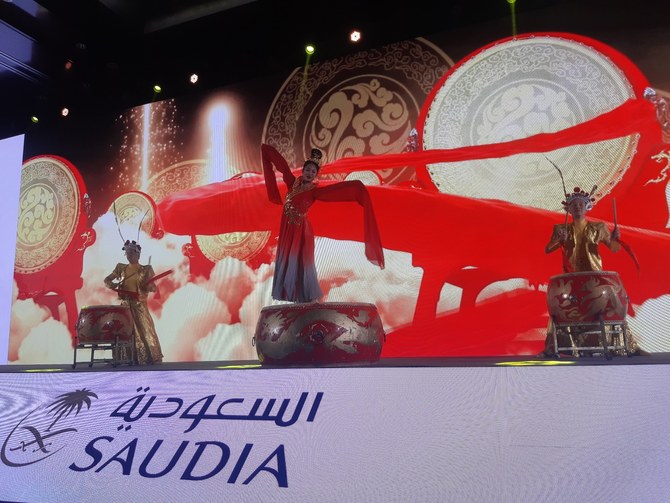BEIJING: In another major step toward strengthening bilateral relations between Saudi Arabia and China, the Kingdom’s flag carrier Saudia launched its first direct flight between Jeddah and Beijing last week.
This move falls in line with Saudi Aviation Strategy, which recognizes the need to increase air connectivity with key markets such as China while accommodating increasing demand from international tourists seeking to discover the Kingdom.
The southern city of Guangzhou was the only destination for passengers visiting China from Saudi Arabia until now.
Over the last seven months, Saudia has introduced as many as 25 new destinations, with the latest launch being the first air route between Saudi Arabia and the Chinese capital.
The company will operate two flights from Jeddah to Beijing every Monday and Friday. While passengers from Riyadh can also directly travel to the Chinese capital every Sunday and Wednesday.
Calling the inauguration of the new route to China a major milestone, Saudia Director General Ibrahim Al-Omar said this is part of the company’s continuous efforts to expand its global network, which now comprises over 100 destinations.
“This affirms Saudia’s commitment to contribute to the National Aviation Strategy, which aims to reach 250 destinations by 2030,” Al-Omar said.
HIGHLIGHTS
The inaugural flight SV886 took off at around 01:15 a.m. on Friday from Jeddah’s King Abdul Aziz International Airport for the Chinese capital with over 290 passengers onboard.
Most of the passengers were Chinese, Brazilians, and Saudis, in addition to travelers from various other countries.
After nearly 10 hours, Saudia’s Boeing 787-9 aircraft made its historic touchdown at Beijing Daxing International Airport, also known as Beijing New Airport.
Upon its arrival, the Saudi plane was given a water cannon salute.
For nearly an hour, another ceremony was held at the Beijing airport celebrating the inauguration of the Beijing-Jeddah route.
Saudia has been in a race to increase its presence globally ever since Crown Prince Mohammed bin Salman launched the National Transport and Logistics Strategy in 2021.
With the introduction of its direct flight to the capital city of China, Saudia aims to tap into a market of more than 1.4 billion people who can explore the Kingdom’s historical sites, tourist and entertainment attractions, international sports events, and cultural diversity.
Commenting on the inauguration, Chinese Ambassador to Saudi Arabia Chen Weiqing told Arab News that the new flights will push communications between the two friendly countries forward.
“China and Saudi Arabia have played and will continue to play a pivotal role in regional and global economic development. We have increasing common interests. We also have common cultural and social values,” Weiqing said.
He added: “I’m very optimistic that these ties will even become stronger. In this regard, I would like to thank Saudia for its efforts in facilitating connections between the two peoples.”
Historic touchdown
The inaugural flight SV886 took off at around 01:15 a.m. on Friday from Jeddah’s King Abdul Aziz International Airport for the Chinese capital with over 290 passengers onboard. Most of the passengers were Chinese, Brazilians, and Saudis, in addition to travelers from various other countries.
After nearly 10 hours, Saudia’s Boeing 787-9 aircraft made its historic touchdown at Beijing Daxing International Airport, also known as Beijing New Airport. Upon its arrival, the Saudi plane was given a water cannon salute.
For nearly an hour, another ceremony was held at the Beijing airport celebrating the inauguration of the Beijing-Jeddah route.
Speaking to Arab News, the airport’s Deputy General Manager Kong Yue stressed that the routes between Saudi Arabia and China are very important and that the two countries are very strong partners.
“In December 2022, our president, Xi Jinping, visited Saudi Arabia, and that was another strength element between the two countries. We believe these routes will help us have more communication in business and travel, and that is important to us,” he said.
Global connectivity
Saudia’s inaugural flight was made possible through a strategic collaboration with the Air Connectivity Program, which seeks to promote growth and development within the tourism and aviation sectors. This demonstrates Saudia’s commitment to leveraging partnerships to enhance global connectivity.
“This new route reinforces Saudi Arabia’s bilateral ties with China, not only in the aviation industry but also in vital sectors like trade, business, tourism, education, and culture,” the company said in a press release.
Saudia aims to help the Kingdom meet its target of welcoming over 100 million international visitors and pilgrims by 2030.
The national carrier, which rose by 11 spots in Skytrax’s World Best Airlines ranking for 2023, also aims to develop human capital by creating quality jobs, nurturing local talent, and enhancing workplace diversity. It wants to increase the number of corporate, leisure, and religious travelers who hold huge potential for passenger and cargo growth.
Inauguration ceremony
Diplomats and dignitaries from different countries attended on Saturday the inauguration ceremony for connecting Saudi Arabia with the Chinese capital at the Four Seasons hotel in Beijing.
Abdulrahman Al-Harbi, ambassador of Saudi Arabia to China, said in his speech that these routes will pave the way for more economic, trade, and cultural cooperation between Saudi Arabia and China.
“As a leading company, Saudia is steadily working to contribute to the goals of Saudi Vision 2030, especially in the tourism sector, in which Saudi Arabia is planning to attract 1 million visitors by 2030, including guests from China,” he said, adding that one of the main tasks of Saudia is to introduce Saudi Arabia to the world.
Al-Omar, on the other hand, said that the first air route between Saudi Arabia and China through Guangzhou was announced on March 27, 2011.
“Today, we are celebrating the second destination, and this is a chance to underscore the strong mutual ties between the two countries, with all the strategic and commercial partnerships. These routes will also reinforce the two nations' communications and cultural exchange, along with other vital sectors, such as trade, business, investment, tourism, and education,” he said.
Al-Omar further said that the operational rates of his company during 2022 affirm a growth in the air traffic between the two countries, as “1.5 million guests have traveled.”
“The increasing investments between Saudi Arabia and China are an indicator of the development and prosperity of their relations,” he said.
The air carrier has announced the launch of a new service that provides guests with even easier access to the Kingdom through a digital integration system that links transit visas with flight tickets.
He also noted that the “Your Ticket, Your Visa” service will allow guests to stay in the Kingdom for up to 96 hours, during which they can travel around the Kingdom and perform Umrah.
Official carrier of PowerChina
On the other hand, a memorandum of understanding was inked between Saudia and Power Construction Corporation of China. The agreement stipulates Saudia be the official transporter of the power giant's workers between the two countries.
According to its website, the company has four brands operating in Saudi Arabia, which are PowerChina, Sinohydro, SEPCO Electric Power Construction Corp., and SEPCO III.































